Overview
The article delineates eight pivotal benefits of automating land record systems for title research. These benefits encompass:
- Increased efficiency
- Minimized errors
- Real-time insights
- Cost-effectiveness
- Compliance assurance
- Enhanced security
- Scalability
- Improved workflow
Each benefit is substantiated by specific examples and statistics that illustrate how automation not only streamlines processes and reduces operational costs but also enhances accuracy and responsiveness in real estate transactions. Ultimately, this positions firms for greater competitiveness in the market.
Introduction
The landscape of land record management is experiencing a significant transformation, propelled by the rapid advancement of automation technologies. By integrating sophisticated AI systems, professionals in the real estate sector can unlock a myriad of benefits that enhance efficiency, accuracy, and security in title research. However, as the industry adapts to these innovations, critical questions arise:
- How can organizations effectively leverage automation to improve their workflows and client satisfaction?
- What are the tangible advantages of automating land record systems, and how do they address the challenges posed by traditional methods?
This article delves into eight key benefits of automation in land record systems, revealing how these advancements can redefine the future of title research.
Parse AI: Accelerate Title Research with Advanced Automation
The AI employs advanced automated technologies, such as machine learning and optical character recognition, to revolutionize the research process for titles. By swiftly extracting essential information from extensive sets of document titles, Parse AI empowers researchers to operate with enhanced efficiency. This automation not only accelerates the research process but also showcases the by ensuring that the information extracted is both accurate and pertinent. Consequently, it serves as a game-changer for real estate professionals who depend on timely and precise data for their transactions.
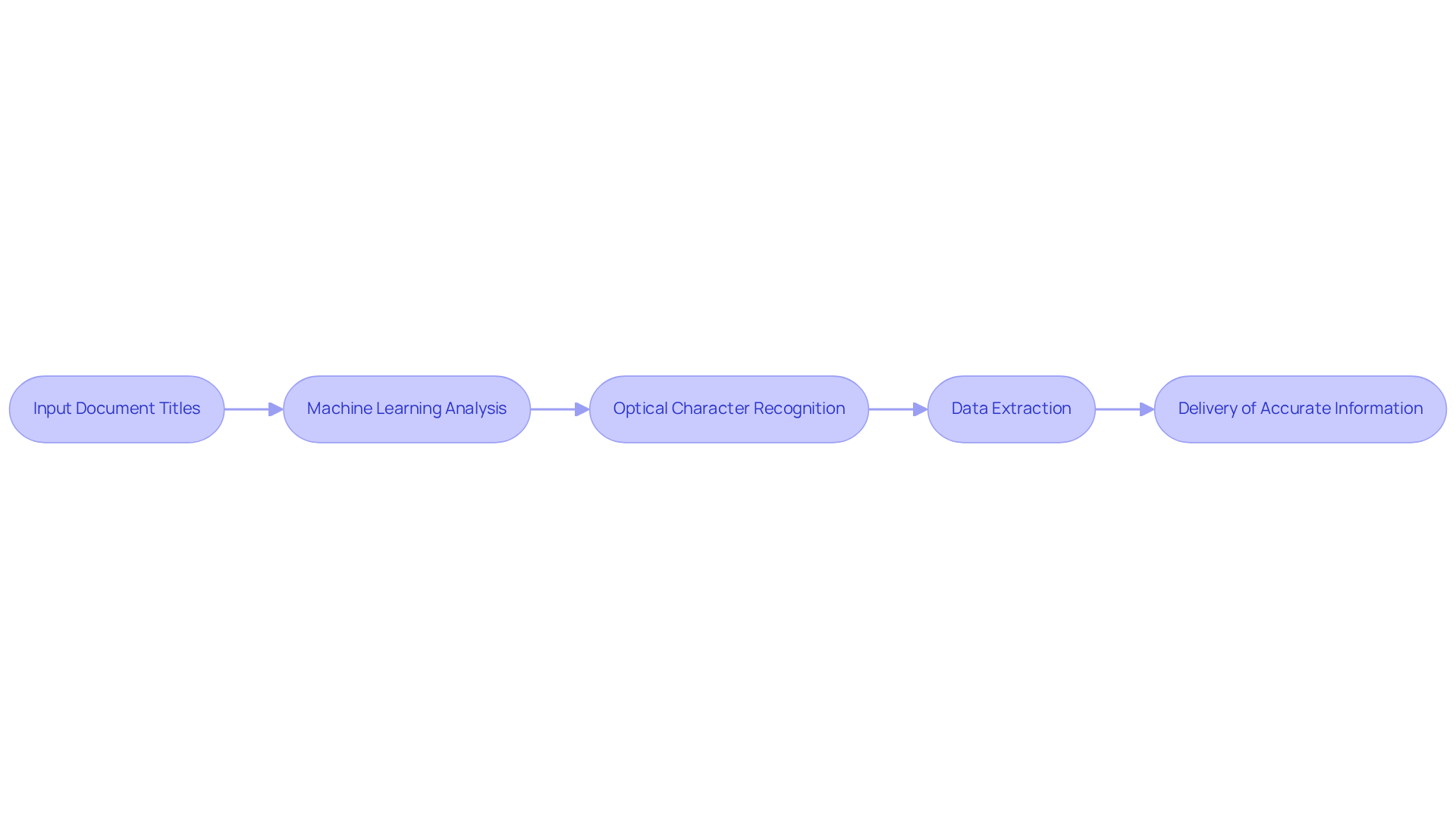
Increased Efficiency: Streamline Processes and Reduce Time Spent
The benefits of automating land record systems transform ownership research by significantly enhancing efficiency. For instance, researchers utilizing Parse AI can complete abstracts and reports in a fraction of the time compared to traditional methods. A notable case study revealed that a national company reduced clearance time from 2-4 hours to just 20 minutes by implementing this technology. This remarkable showcases the benefits of automating land record systems, enabling professionals to manage more cases concurrently, which leads to faster closings and improved client satisfaction.
In fact, 72% of workers believe that inefficient processes adversely affect their jobs, underscoring the necessity of automation in overcoming these challenges. The benefits of automating land record systems include:
- Rapid access to and analysis of data, which facilitate seamless real estate transactions and effectively eliminate unnecessary delays.
- Automated data entry systems can cut document retrieval time by 50%, further streamlining workflows and enhancing operational effectiveness.
Enhanced operational efficiency elevates customer satisfaction by reducing wait times, showcasing the benefits of automating land record systems and positioning research firms for greater competitiveness in the market.
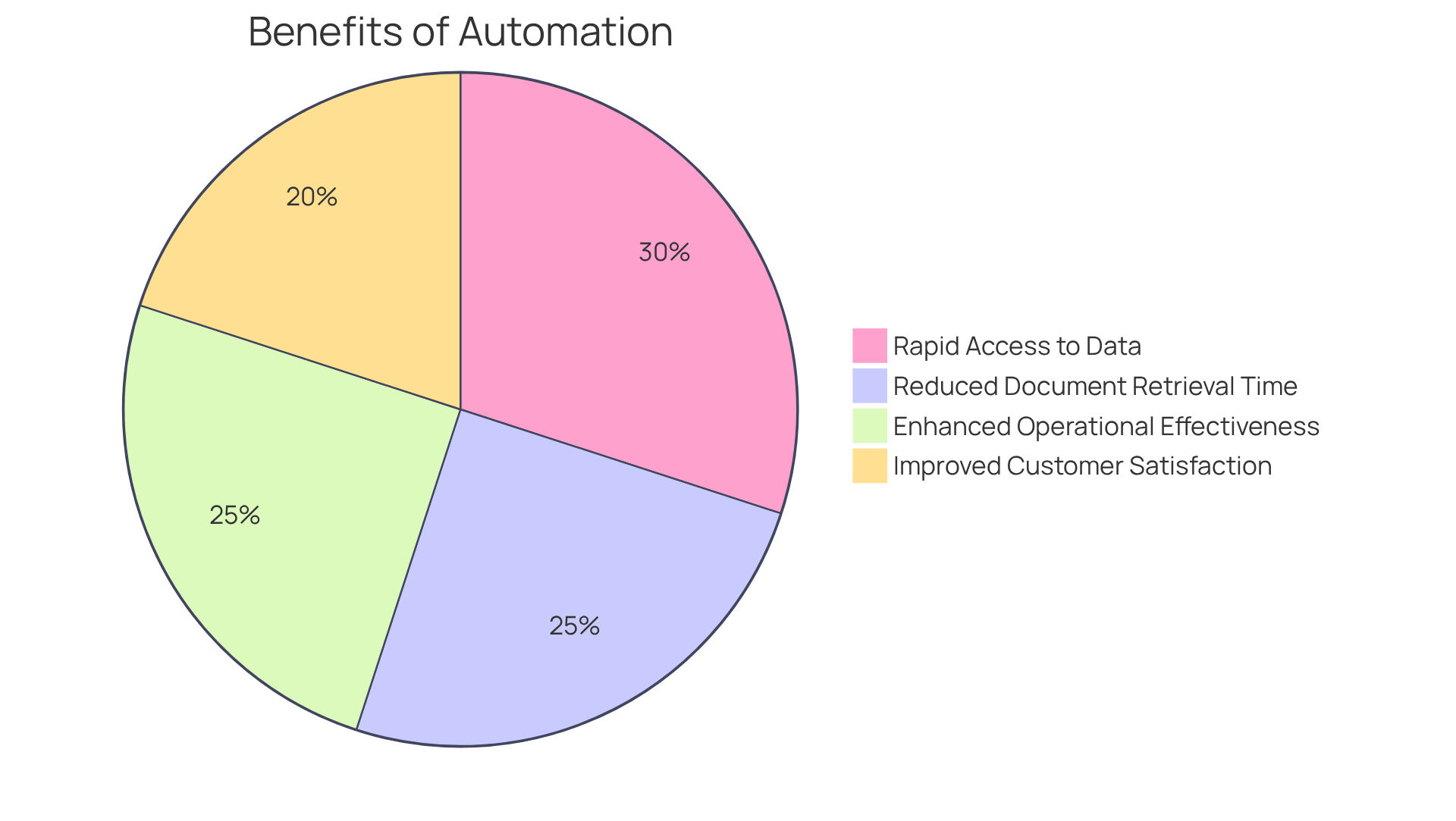
Minimized Errors: Enhance Accuracy in Record Keeping
The benefits of automating land record systems significantly reduce human error, which is a critical concern in manual data entry. Parse AI utilizes advanced algorithms to extract and interpret data from title documents with exceptional precision, achieving accuracy improvements of up to 90% in mitigating manual errors. Such a is vital in land documentation; even minor mistakes can lead to considerable legal complications and financial consequences.
For instance, firms that have implemented automated systems have experienced the benefits of automating land record systems, reporting a 32% reduction in human error, thereby enhancing overall efficiency and dependability in documentation. Furthermore, the integration of mechanization fosters confidence among clients and stakeholders who depend on accurate property information for their transactions.
As industry experts emphasize, maintaining high precision in land documentation is essential for compliance and operational effectiveness, which underscores the benefits of automating land record systems as imperative for modern property research.
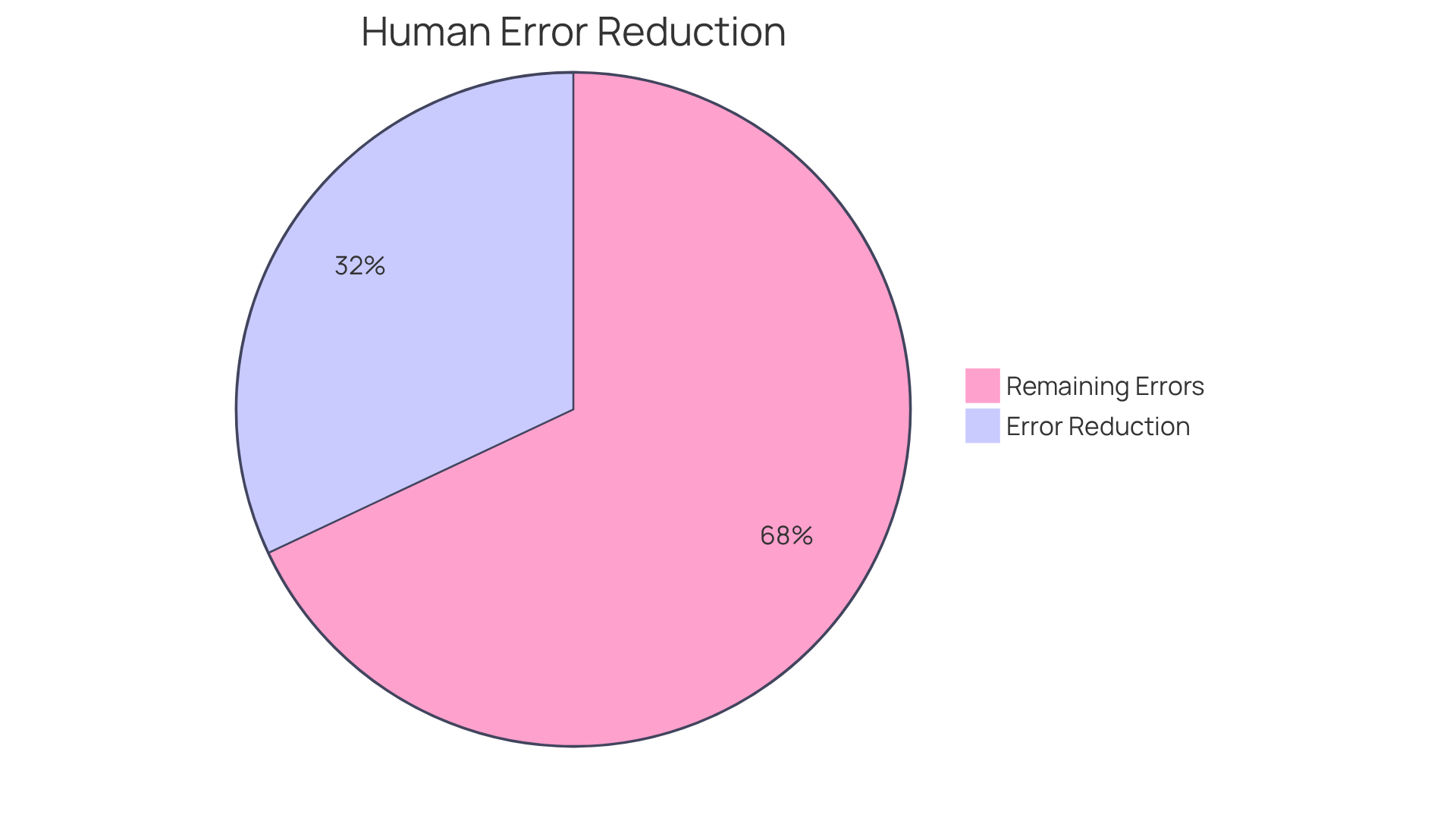
Real-Time Insights: Access Up-to-Date Information Instantly
Automated land information systems empower researchers with immediate access to current data. The AI continuously refreshes its database, ensuring that users have the most up-to-date information readily available. This capability is crucial for , enabling professionals to swiftly respond to changes in property ownership or legal statuses. Consequently, the risk of outdated information impacting transactions is significantly reduced.
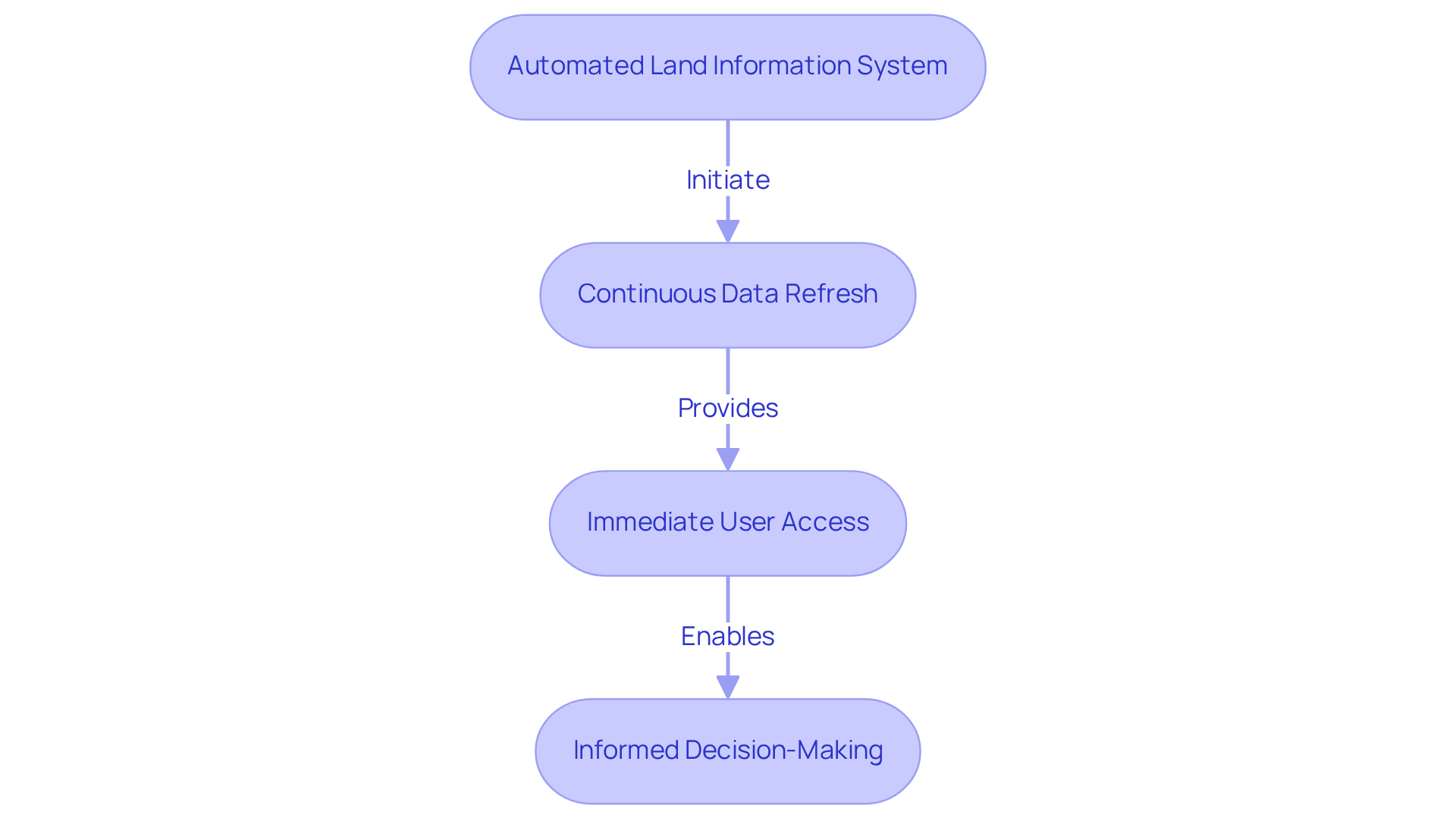
Cost-Effectiveness: Reduce Operational Costs with Automation
Ownership research companies experience significant operational expense reductions from the benefits of automating land record systems. This and minimization of errors not only enhances resource allocation but also demonstrates the benefits of automating land record systems, allowing companies to focus on strategic initiatives that drive growth and improve service offerings.
Research indicates that title research companies leveraging technology can achieve operational cost reductions averaging 20-30%. For example, firms that have integrated Parse AI report labor cost savings reaching up to 50%, which enables reinvestment in both technology and talent.
As Bernard Marr states, 'Companies implementing robotic process automation (RPA) achieve an average of 25-50% labor cost savings.' Such financial efficiency not only strengthens the bottom line but also equips firms to respond more agilely to market demands, ultimately enhancing their competitive edge.
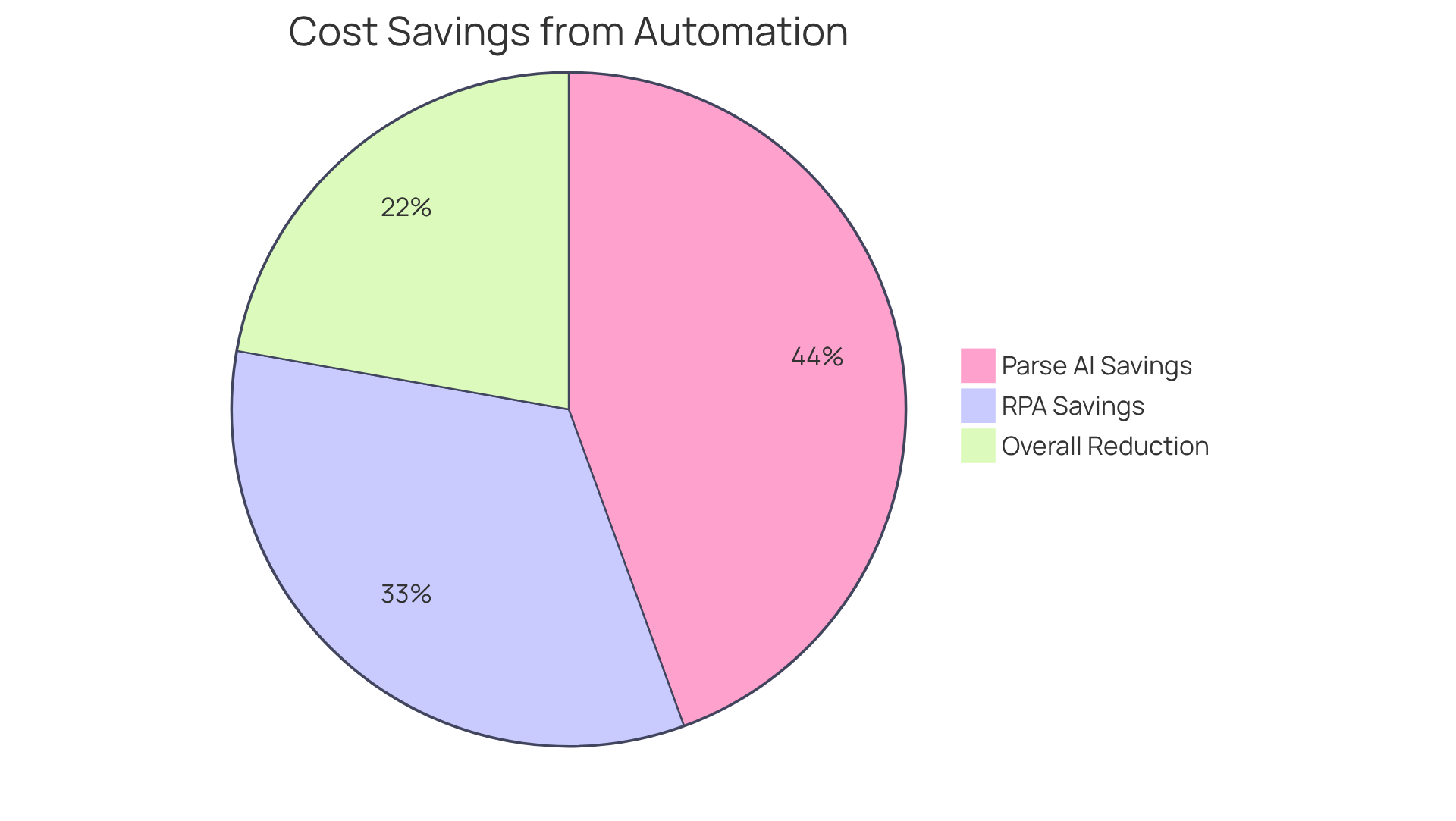
Compliance Assurance: Maintain Legal Standards and Tax Accuracy
The benefits of are crucial for ensuring compliance with legal standards and achieving tax accuracy. Parse AI's technology is meticulously designed to adhere to the latest regulations, thereby significantly reducing the risk of non-compliance that can result in costly penalties. By maintaining precise documentation and fulfilling all legal obligations, title researchers can operate with confidence, safeguarding both their clients and their enterprise.
Furthermore, we offer flexible subscription options, including:
- Monthly plans
- Annual plans
- Pay-as-you-go plans
This allows you to select the best fit for your needs. Our customer success team is readily available to discuss tailored solutions as we expand our services to new counties in Texas, New Mexico, and Ohio, inviting customer requests to better serve your requirements.
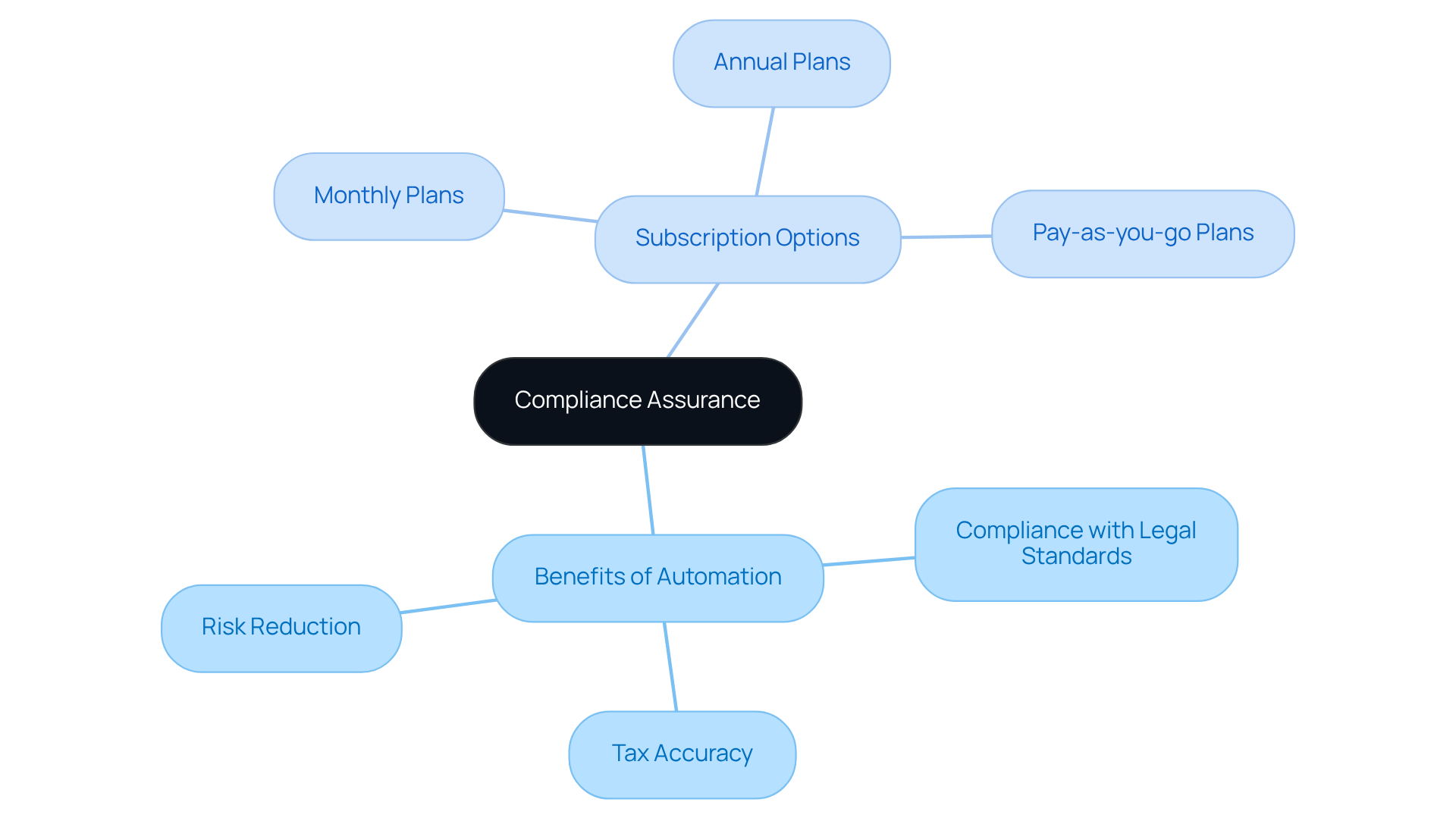
Enhanced Security: Protect Sensitive Land Records from Breaches
In an era marked by escalating cyber threats, the safeguarding of sensitive land documents has become imperative. The benefits of automating land record systems with Parse AI significantly enhance security protocols, ensuring that data is both securely stored and transmitted.
By employing advanced encryption methods and stringent access controls, organizations can effectively thwart unauthorized access, thereby instilling confidence among researchers and their clients. This elevated security is not merely a technical enhancement; it is crucial for maintaining trust within the real estate sector.
With 50% of businesses reporting in the past year, the necessity for robust data protection measures is clearer than ever. As specialists emphasize, the integrity of real estate dealings hinges on the secure management of sensitive information, which underscores the benefits of automating land record systems as an essential strategy for contemporary property research.
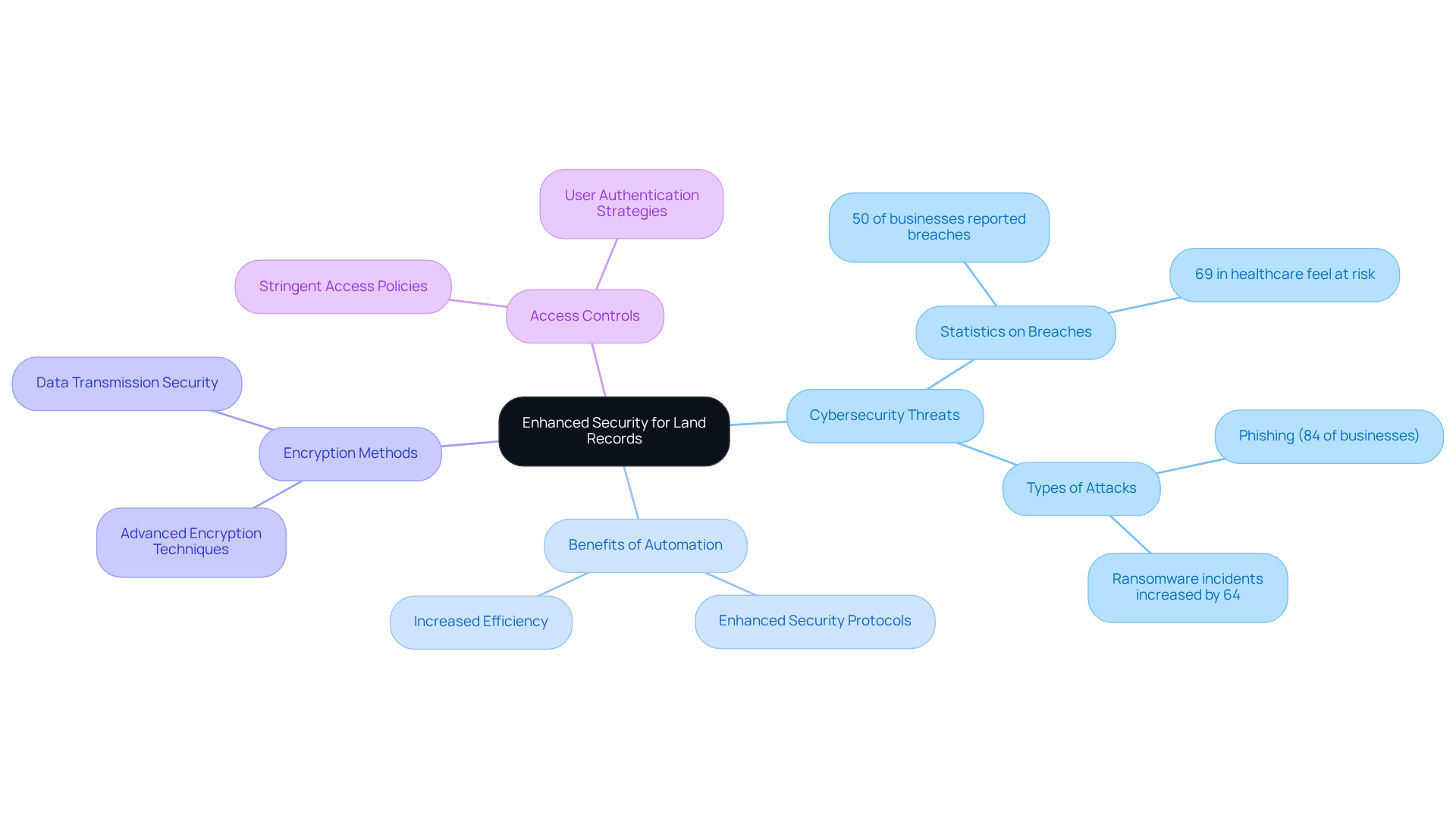
Scalability: Adapt to Growing Needs of Land Record Management
As real estate markets continue to evolve, the necessity for scalable solutions in land management has become paramount. The benefits of automating land record systems with advanced AI enable research companies to adapt seamlessly to increasing transaction volumes and market expansion, all while upholding quality and efficiency.
For example, firms utilizing automated systems can realize the benefits of automating land record systems by processing nearly 14 million documents annually, with over half of these documents managed online, demonstrating considerable enhancements in operational productivity and efficiency. This scalability not only enables firms to effectively handle transaction surges but also positions them to seize new market opportunities.
With 63% of small to medium-sized businesses projected to host their workloads in the within the coming year, and 54% of SMBs investing more than $1.2 million in cloud services annually, integrating automated systems is essential for maintaining competitiveness. By embracing these innovations, property research operations can ensure they meet client demands while upholding high service standards.
As industry experts note, "Cloud computing not only enhances operational efficiency but also significantly reduces the Total Cost of Ownership (TCO) by as much as 40% for organizations that migrate to the public cloud.
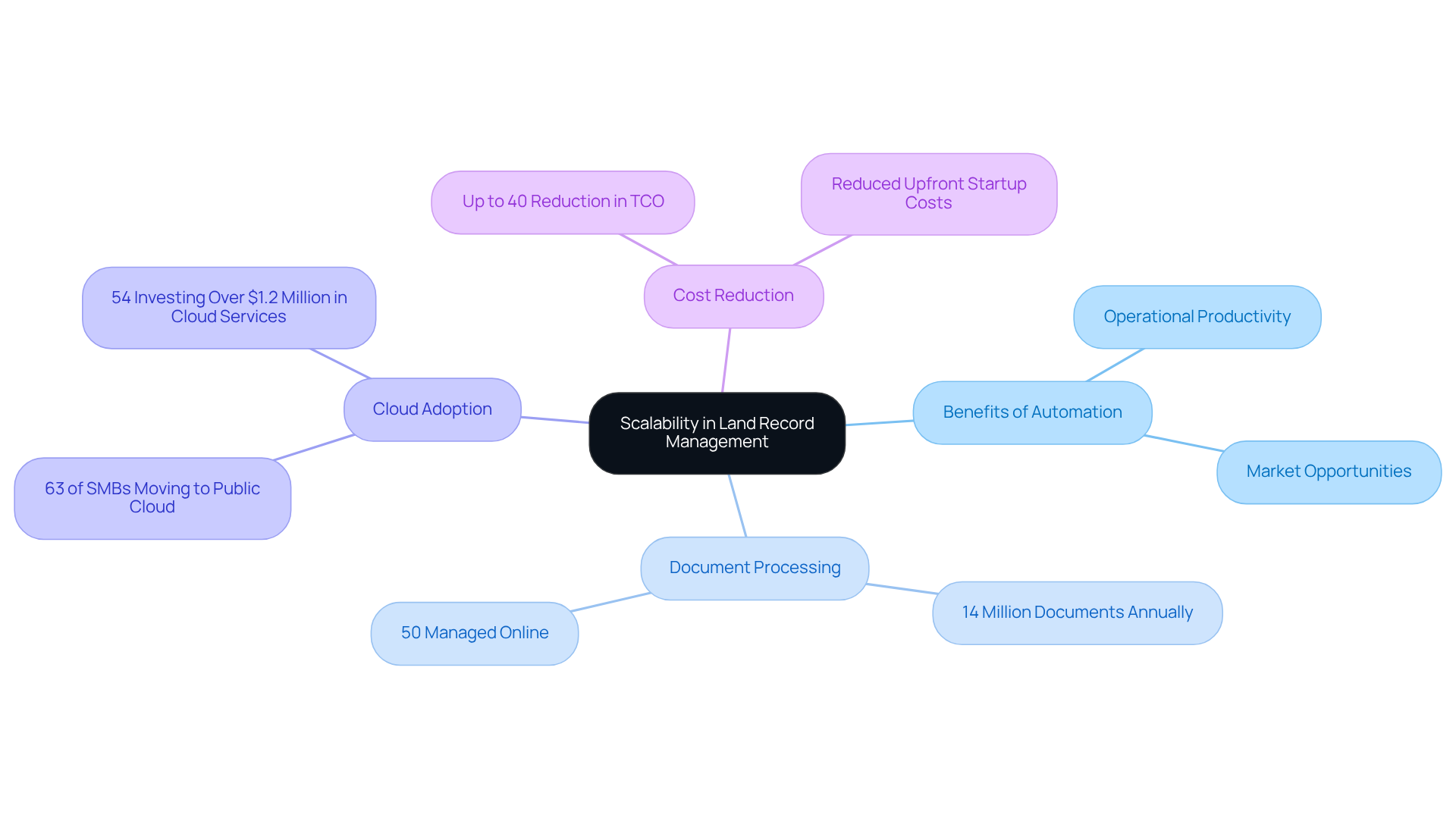
Task Automation: Free Up Resources for Strategic Initiatives
By automating routine tasks, this AI empowers researchers to allocate valuable resources towards more strategic initiatives. Rather than dedicating time to manual data entry and document review, professionals can concentrate on higher-level tasks such as:
- Client engagement
- Market analysis
- Business development
This transformation not only elevates job satisfaction but also propels overall business growth. In fact, 57% of surveyed companies reported improved employee engagement following the implementation of Robotic Process Automation (RPA), and 60% of business owners anticipate that AI integration will enhance sales growth. Furthermore, 65% of global businesses have embraced AI to minimize manual or repetitive tasks, underscoring a significant trend towards automation within the industry.
To facilitate these initiatives, the AI platform offers flexible subscription options, including:
- Monthly plans
- Yearly plans
- Pay-as-you-go model
This ensures that researchers can choose the optimal solution for their needs. Our customer success team stands ready to discuss tailored options that align with your specific requirements.
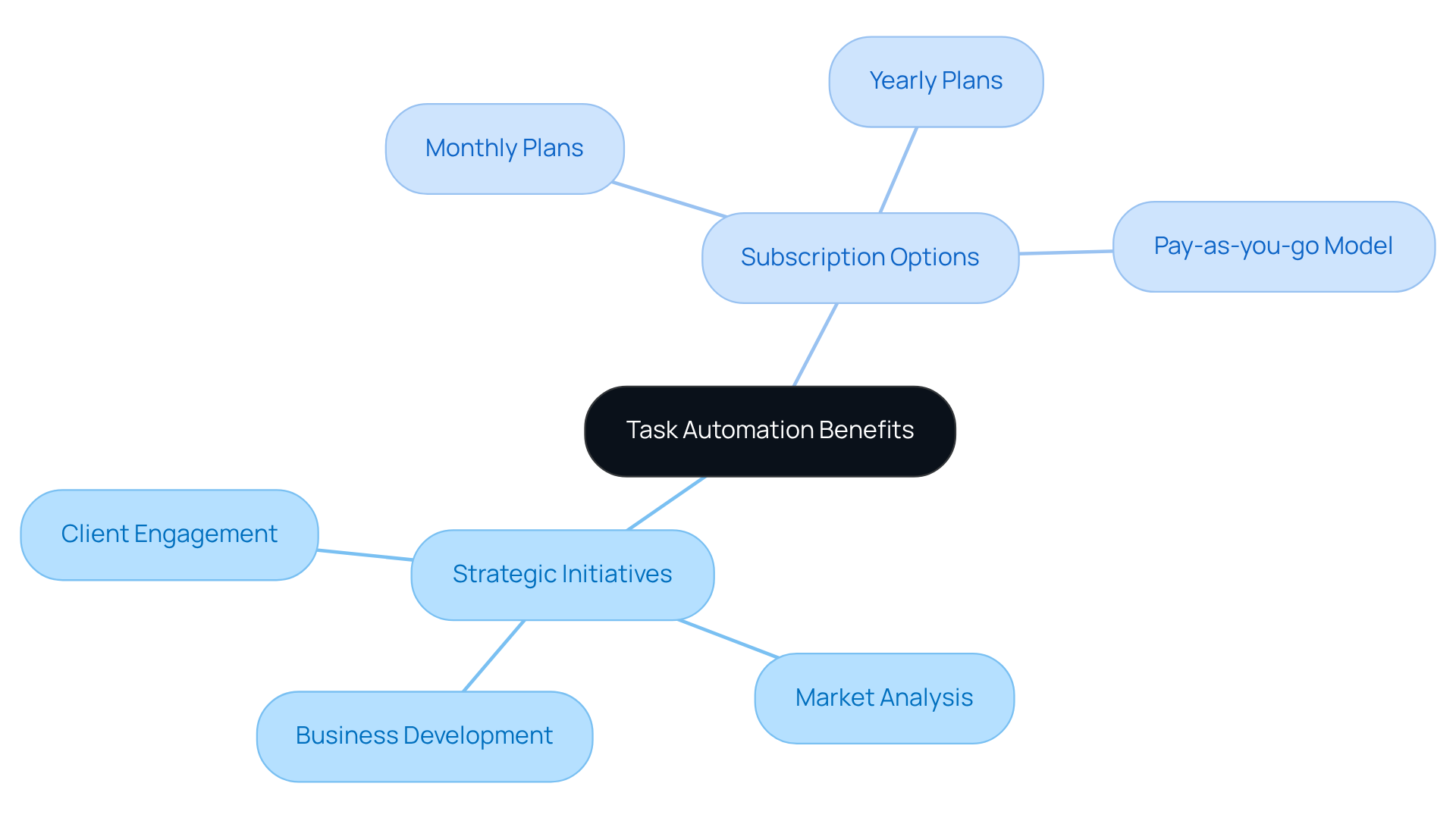
Improved Workflow: Optimize Operations for Better Productivity
The benefits of automating land record systems significantly enhance workflow and optimize operations. With , title researchers can seamlessly integrate various tasks, minimizing the time spent on transitions between processes. This optimization not only boosts productivity but also fosters collaboration among team members, as everyone can access the same up-to-date information.
Organizations that adopt automated processes often highlight the benefits of automating land record systems, reporting an average productivity increase of 25-30%. Furthermore, 62% of businesses have identified three or more significant inefficiencies that could be addressed with workflow optimization. In addition, 76% of companies employ technology to standardize daily workflows, enhancing consistency and efficiency.
Significantly, 51% of employees allocate a minimum of two hours each day to repetitive tasks, highlighting the need for mechanization to tackle these inefficiencies. By leveraging technology, title researchers can streamline their operations, ultimately leading to improved outcomes that highlight the benefits of automating land record systems and fostering a more cohesive work environment.
As Stefanie Jansen observes, the typical business saves $46,000 each year by using automated processes. Title researchers should assess their current workflows to identify areas ripe for automation, ensuring they maximize the benefits of these innovative solutions.
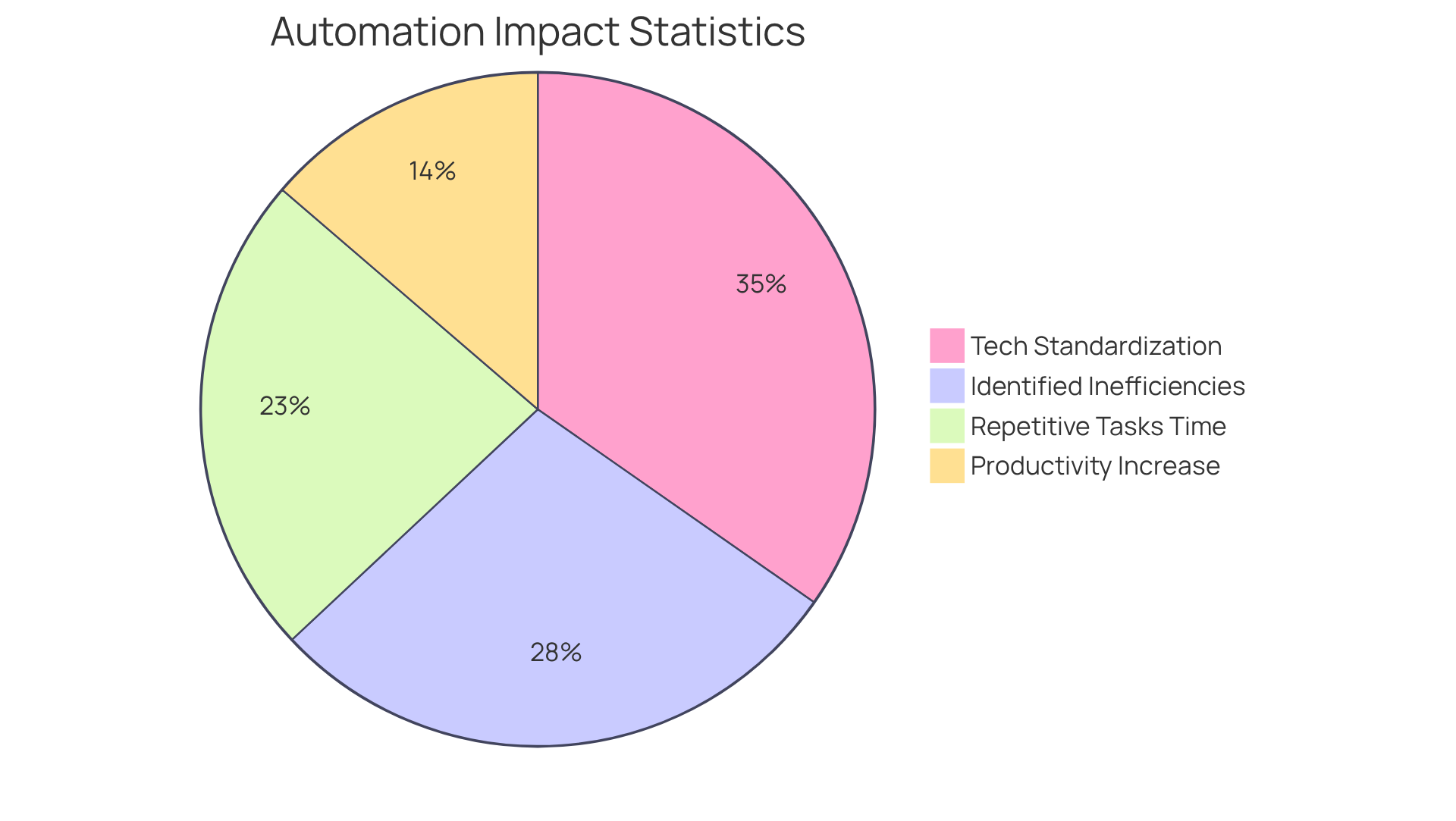
Conclusion
The automation of land record systems signifies a transformative shift in title research, fundamentally enhancing efficiency, accuracy, and security. By leveraging advanced technologies such as AI and machine learning, professionals in the real estate sector can streamline processes, significantly reduce errors, and ensure compliance with legal standards. This not only accelerates the research process but also positions organizations to respond adeptly to the evolving demands of the market.
Key insights from the discussion reveal the myriad benefits of automation:
- Achieving remarkable reductions in research time and operational costs
- Ensuring real-time access to up-to-date information
- Fostering improved workflow and collaboration among teams
- Driving greater productivity and client satisfaction
- Protecting sensitive information with enhanced security measures
The implications of embracing automation in land record management extend far beyond immediate efficiencies. As the real estate landscape continues to evolve, adopting these innovative solutions is essential for maintaining competitiveness. By prioritizing automation, organizations can optimize operations and free up valuable resources for strategic initiatives that drive growth and innovation. Engaging with these advancements is not merely a choice; it is a necessity for future-proofing title research in an increasingly digital world.
Frequently Asked Questions
What is Parse AI and how does it assist in title research?
Parse AI employs advanced automated technologies, such as machine learning and optical character recognition, to revolutionize the title research process by swiftly extracting essential information from extensive sets of document titles, enhancing researchers' efficiency.
How does automating land record systems improve efficiency?
Automating land record systems significantly enhances efficiency by allowing researchers to complete abstracts and reports much faster than traditional methods. For example, a national company reduced clearance time from 2-4 hours to just 20 minutes after implementing this technology.
What are the benefits of automating land record systems?
The benefits include rapid access to and analysis of data, reduced document retrieval time by 50%, enhanced operational effectiveness, faster closings, improved client satisfaction, and increased competitiveness in the market.
How does Parse AI minimize errors in record keeping?
Parse AI reduces human error by utilizing advanced algorithms to extract and interpret data from title documents with exceptional precision, achieving accuracy improvements of up to 90% and reducing human error by 32% in firms that have implemented automated systems.
Why is accuracy important in land documentation?
High accuracy in land documentation is crucial because even minor mistakes can lead to significant legal complications and financial consequences. Maintaining precision is essential for compliance and operational effectiveness in property research.




